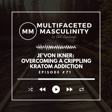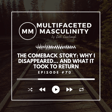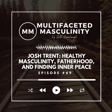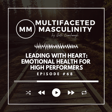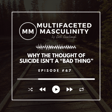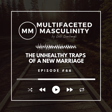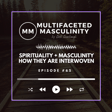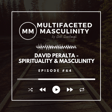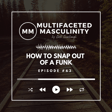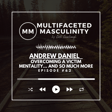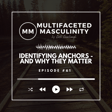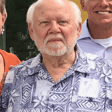Introduction to Mindful Living
00:00:00
Speaker
I love having conversations with people that challenge me, but also are just really fun to have at the same time. They're insightful, they're challenging, they're beneficial, they're mutually beneficial. And today's conversation was definitely just that for me.
00:00:16
Speaker
I went into it and I said in the beginning the selfishly looking for nuggets on how to be able to slow down and we dive into that topic is amongst other things as well. But the biggest thing was slowing down because sometimes at least for me that feels almost impossible because I've got so many things going on.
00:00:35
Speaker
And my guest today, Michael, he, he gave some really practical application as to how to integrate micro moments into slowing down amongst other things. So without further ado, let's go ahead and dive into the conversation for today of how the hell do you slow down when life seems so crazy?
Masculinity and Life-Changing Events
00:00:56
Speaker
Men, we are not simple, chest-thumping, rock-smashing, fire-starting barbarians. We have depth. We intensely feel. We are scared, yet brave. We love to have fun. We're imperfect and make mistakes. We're compassionate and loving. We are multifaceted. Let's explore the reality of masculinity together.
00:01:24
Speaker
Today, I'm actually really excited, selfishly excited about today's guest because we were just talking beforehand a little bit and one of my areas of struggle, I've got a lot of them, I'm human, but one of them for me is just with five kids and everything else I've got going on, is learning how to slow down, learning how to pace myself and not burn out. And my guest today,
00:01:52
Speaker
actually had a pretty dramatic life event that was a catalyst for him into what his passion now is, which is helping people do that very thing. So I'm hoping that you guys can benefit from it today, but selfishly, I'm looking to grab a handful of nuggets. And so, Michael, welcome to the podcast, and I look forward to kind of diving into this topic of slowing down. Awesome, Josh. Good to be with you.
00:02:19
Speaker
been looking forward to this for quite some time. Just love what you're putting out into the world and really helping us dudes learn that we don't have to be one dimensional, that there's a whole bunch of stuff brewing inside, maybe behind our body armor. So yeah, I'm looking forward to diving in with you and
00:02:44
Speaker
talking about how to slow down and a whole bunch of other things I imagine as the conversation unfolds. Yeah, yeah. Well, I was fascinated by just your life story and how your life, I think for a lot of us, just in life, sometimes things that can be dramatic can be a catalyst into our passions or things that we may not have realized were something that we'd become passionate about until we had to become passionate about it.
00:03:12
Speaker
So can you just, just opening up, just share with my listeners, what got you started on this journey of mindfulness, slowing down, et cetera?
The Accident That Changed Everything
00:03:21
Speaker
Sure thing. So I will start off much like you did. I'm still trying to figure it all out, so I don't have all the answers either. But growing up, I grew up in upstate New York and I did, I think I did the typical
00:03:40
Speaker
guy journey, like what I was supposed to do following that script. You know, I was really into sports. I thought sports were, was my ticket for recognition and dare I say, love and appreciation from my parents and other people. So I got really good at sports. I was okay at school, but sports was my jam. So I really viewed myself as an athlete. And yeah, you know, you work hard in high school and get a
00:04:10
Speaker
college, you meet someone after college, you start a career, you have a couple of kids, you work your way up the corporate ladder. So that script that I think a lot of us guys get at birth or teenage years or whenever we get it, I thought I was doing a pretty dang good job following it. And I had reached a pretty high level in my company.
00:04:35
Speaker
I was a marketing director for a pharmaceutical company and we had a meeting out in New Mexico, one of those off-sites Monday through Friday type of thing where we do team building and all that good stuff. And I brought my bike out. So I am an avid cyclist, have been since the moment I came off of training wheels when I was like five years old. And I was training for a race and on July 11th, 2001, so it dates back 20 years.
00:05:05
Speaker
I bought 21 years. I came around a band on this loop I created on the hotel property and a Ford Explorer was coming right at me, crossed fully into my lane. It was so surreal,
Mindfulness as a Path to Healing
00:05:20
Speaker
Josh. I was like, what's happening? He's got to see me. He's going to move. He's going to move. But he was moving way too quickly and I was traveling about 20 miles per hour myself.
00:05:34
Speaker
After that, it's physics, right? A massive collision. I remember everything about it, the sound I made when I went into his front grill, the sound I made when I went through his windshield, and then the screech of his brakes, and then the thought I made when I fell off his hood onto the asphalt below. As you can imagine, that knocked me unconscious. When I regained consciousness, I was surrounded by police, fire, EMTs,
00:06:04
Speaker
And I knew the situation was like a woe Nelly moment. Yeah. Back then, since I wasn't really comfortable, like expressing different emotions and dealing with like tough situations, I would use humor to cut the tension. So I asked the question that only another cyclist can totally appreciate. I was like, Hey, how's my bike? And, um, they looked at me and they're like,
00:06:32
Speaker
I go, your bike, they're like, your bike's fine, which by the way, wasn't fine. It's totally demolished. They told me to breathe. I was trying to figure everything out and fast forward. They put me on the medevac to take me to Albuquerque. I had broken a whole bunch of everything. The femoral artery of my left leg was lacerated. So I was losing a ton of blood. I spent close to five days in ICU.
00:07:00
Speaker
Came out of the ICU. Doctors painted this pretty grim picture of my life. Their predictions were probably not going to walk well again. Not going to get on the bike ever again, based on your injuries. So you should be just lucky that you're alive, Michael. You know, that was the message. And I remember when I was on the helicopter flying to Albuquerque, I told whoever was listening, I said, okay, here's the deal.
00:07:30
Speaker
If I live, because that was really in question, I could feel it because that was in so much pain. I was like, if you save my life, I promise I'll stop chasing my happiness. Wow. Because that's what I would do, like corporate life. And again, I think this is something that we buy into is that our happiness is on the other side of that promotion or current day, how many followers you have or the house or what your kids do and all that jazz.
00:08:01
Speaker
And so when they told me about what my life was going to be like, I was like, well, I can't even spell happiness. And the thing that made it hard was my identity as an athlete, as a provider, as a leader at work had been flipped upside down and shaken violently. And I was like,
00:08:22
Speaker
Why did this happen? I'm a good person. Why do bad things happen to good people? That was sort of my narrative. Why did this happen to me? And then the rest of it was like, they flew me back to New Jersey. And then I had a moment when I knew I had to heal my mind in order to heal my body.
00:08:44
Speaker
And that very next morning was the first morning with mindfulness. I did a box breathing pattern and just to slow everything down because the whole, the whole thing was so overwhelming. I couldn't, I couldn't process it and I was freaking out. And so I just knew as an athlete that your breath is so important. So I was like, all right, let's go back to my breath.
00:09:11
Speaker
Again, knowing nothing about mindfulness or meditation back then, except I thought it was a little woo-wooish, like a little soft. Like real men don't do this. But I was like, I'm desperate and I'm going to try anything because I got to get out of this hospital. I want to try to get on with my life.
Slowing Down in a Fast-Paced World
00:09:33
Speaker
It's interesting how when your life is literally on the line, you don't really care so much about stereotypes as you care about effectiveness for things. It changes that. Oh, absolutely. Yeah. I was like, all right. Um, you know, and the thing is I didn't tell anyone I was doing it. Okay. I, I was, I was like, I'm just going to do this and we're going to see how this works. So I did it one day and then it,
00:10:00
Speaker
it worked. And I was like, Oh, we'll do it tomorrow and then we'll do it the next day. And for the longest time, eventually I left the hospital, went back to my career, but with a different script, a different perspective. So I wasn't like on the hamster wheel, you know, just spinning. Yeah. But even with all that, even
00:10:21
Speaker
how my mindfulness practice was making a difference in my life. I still didn't want to talk about it with my corporate colleagues or my bosses because, you know, back then it was still considered a little woo woo or feminine or soft. So I just kept it a secret until I left my corporate world and started the next chapter of my life.
00:10:47
Speaker
Yeah, well, I mean, I personally, I think that men embracing that softer side is important to acknowledge and to explore and to be willing to
00:10:59
Speaker
just embrace as a well balanced well grounded man because I think you touched on something that I mean you glazed over it but as far as men using sarcasm to create that sense of shield right so if I if I use sarcasm to deflect people from that softer core of who I actually am as a man
00:11:20
Speaker
then I protect myself, a false sense of security, of protecting myself, and not actually getting hurt. Because if I never let you see the real me, then I never let you hurt the real me, even though it creates this shallow shell of things that really matter in life. Absolutely. I did that all the time. Yeah, yeah. Well, I think a lot of us met, especially in the Marines, right? For me, it was like,
00:11:48
Speaker
Talk about an environment where emotion is weakness and you just mind over matter, you don't mind, it doesn't matter, like all of that. And I think when you're training for the military, where you're literally going to kill other people, there is a component of that that is necessary. It's not healthy, but it's necessary, right? But learning how to unwind that and reprogram my own mind has been a journey for sure.
00:12:12
Speaker
So I'm curious, because you had been doing well in the corporate world. Obviously, you had this massive life event that essentially forced you, it sounds like, to slow down. You didn't have a choice. And then turning to box breathing, et cetera. But not everybody gets hit by a car, right? Hopefully not everybody. And so I'm just curious why you think people feel, how do I put it?
00:12:40
Speaker
almost an obligation to stay in that rat race, that faster pace and not slow down. Like how can, how can other guys listening to this not get hit by a car to learn the importance of slowing down and incorporating whether it's breathing or yoga or whatever it may be to slow down and embrace that softer side? Yeah, that's a great question, Josh.
Redefining Success Through Mindfulness
00:13:03
Speaker
I think the universe or whomever
00:13:06
Speaker
sent me the Ford Explorer because I was ignoring the hints prior to that day. And I think we all have those hints popping into our lives. And yeah, I don't want anyone to get hit by an SUV. Too many people are hit by SUVs in cars nowadays anyway. But I do believe that
00:13:33
Speaker
we know the hints. We know those moments. We can feel them in our body. We feel the stress. Even though we might have our body armor on, we still feel it. That's when we double down on the armor and we use a little sarcasm, a little humor.
00:13:51
Speaker
I have greater faith in us creatures, us humans, that we know what's happening for the most part. And then we come up with ways to protect ourselves or hide or however you wish to talk about it. So I think as you pay attention to those hints, then you can step into maybe a practice of yoga or mindfulness or something else that
00:14:21
Speaker
is self-care basically in that realm. That's good for your head, it's good for your heart, good for your body. I think the reason why we don't is that we have a story around what has got us to this point in our lives and to adopt something new like this.
00:14:42
Speaker
requires shifting your story. And there is a worry there to say, well, if I start doing something like this or something maybe completely different, will I still be successful? So there is a faith, if you will, or a belief to say, okay, what got me here isn't gonna help me get me there. I have to play the game differently. Everyone out there,
00:15:10
Speaker
still to this day, for at least critical mass, is playing the game the same way we played it three years ago. Hustle and grind, be tough. And I think this moment in time, after all that we've been through as a planet, as a country, as communities, it's an invitation to all of us, not just guys, to play the game differently, but we have to lose that narrative
00:15:38
Speaker
that if I do something like this, I won't be less successful in my job. And that's the narrative or in life, that's the narrative we hold on to. It really opens up the door to be more successful or successful in a different way. Yeah, I love that. I mean, there's a something I exercise I like to do with my clients, which is to literally start by defining what success is for them.
00:16:05
Speaker
And a lot of times they'll default to that old story, right? And then respectfully, lovingly, I say, okay, but that's what your definition of success has been. And you're meeting with me because you're not happy.
00:16:20
Speaker
So there's a mismatch between your perceived definition of success and what real success is. So let's dive into what is that success. And most of the time it's connection with my wife, it's time with my kids, it's creating shared experiences with friends and family. It's those kinds of things that
00:16:41
Speaker
I mean, obviously you still need to pay the bills, right? But chasing this narrative of success, you know, one thing I love to do to throw people a curve ball, especially guys, I feel like women are more attuned to this answer than guys are, but I'll just ask them, you know, so who is Michael, comma, separate from what you do? Like take away what you do. Now, who are you? And nine times out of 10, they're like,
00:17:10
Speaker
I'm a coach, I'm an entrepreneur. That's all the shit you do. Like who are you? And when they can't answer that, it's a little bit of a wake up call to, you know, kind of an aha moment of man, I haven't really looked at who I am.
Beyond Career: Relationships and Health
00:17:27
Speaker
I haven't slowed down enough to find out who I actually am.
00:17:32
Speaker
And then you begin to peel back those layers of, oh, I've been doing these coping mechanisms and these checkouts and this numbing and this and that and that and that, just to not look at that. Cause a lot of times that's where our pain lies, our disappointment, our trauma, our lack of love, whatever it may be. And we just don't want to face that, right? We don't want to look at that stuff. So if we stay busy enough to not feel anything.
00:17:52
Speaker
Then that, that is this perceived thing of success, but then you're a millionaire all by yourself. Nobody really knows you. You're divorced twice and great. You've got a big house. Congratulations. Absolutely. Yeah. The big house only takes you so far because if you're fortunate to have kids, if you've wanted kids and have kids, you get to a point in your life that that big house feels really empty. Yeah. The kids leave the house.
00:18:22
Speaker
Right. So there's, there are stages in life. And if we want to live a life where our last step on this planet is one of our best ones, you know, I want to, I always want to finish strong, right? I got my bike across the country last year. And my intention, my vision for myself as I did this ride was that my first pedal stroke and last pedal stroke.
00:18:50
Speaker
would be equally strong. Like I would be limping across the finish line. And we do so much of that, I think, in life where we just throw ourselves into our career and eventually, whether you're 50 or 60 or 65, whenever you happen to hang up your cleats from your corporate life or your entrepreneurial journey, there's still 30,
00:19:19
Speaker
35 more years to live. How do you wish to live? What's the quality of your emotional mental health? What's the quality of your physical health? What's the quality in, this is what I love about your show and what you're bringing Josh. What's the quality of your relationships? Because we know this, that our relationships drive our happiness. And for a lot of us guys, the relationships we have at work,
00:19:48
Speaker
I will be the first one to say a small percentage of them will be with you once you leave that company. So you have to work on developing relationships outside of your place of employment and making sure they're as strong as they possibly can be. So when you do move into other phases of your life, you have a sense of community. You have a sense of belonging because that sense of belonging
00:20:17
Speaker
does drive later in life your definition of success and happiness. Yes, yeah. And I don't know about you, but for me, I've always set a standard of those relationships I build outside of what I do. And like you said, there can be cross pollination. I agree with that 100%. But even within that cross pollination, for it to last more times than not, there's been vulnerability involved in some capacity.
00:20:42
Speaker
and or inconvenience, like my closest friends are inconvenient at times, but it's a reciprocal, right? I mean, I have a friend who when I literally was going, I was going through my divorce, one of my lowest points in my life, had a gun to my head and called him up and he's like, I'll be there in 10 minutes. That wasn't practically convenient, right? And now he's going through something and I'm like, I've got all this going on in my land and five kids and da da da da.
00:21:11
Speaker
I'm going to drop what I'm doing. I'm going to spend the weekend with you because he's going through some stuff. And so I feel like that depth comes with a combination of vulnerability and our inconvenience. It may be the wrong word to use, but going out of your way with intentionality to build that depth that, like you said, creates that happiness. But I'm curious for us guys, right?
Overcoming Fear of Slowing Down
00:21:36
Speaker
Because that's who we're speaking to today.
00:21:39
Speaker
Why do you think, in your opinion, why do you think it's so scary to slow down? Great, great, great question. I think it comes from the narratives that we've developed over time, whether they come from authority figures, parents, society of what it means to be a guy and some
00:22:08
Speaker
I think influencers current day that glorify a hustle culture. And part of the hustle culture is getting more, like more money, more stuff, more status. And I'll be the first one to say like money is great. I think you should know.
00:22:32
Speaker
what money means to you. Like why are you pursuing it? Because there will always be another dude with more money. So for me, my relationship with money has changed over the course of my life. So it's not, you know, it still matters because I want to have experiences in my life and that takes some money. So yeah.
00:22:55
Speaker
and climbing the corporate ladder, so you have say, influence, you can make an impact, still good. So those just by themselves are not bad. It gets unhealthy when we just singularly focus on that and we lose ourselves and we don't rest, we don't take a break. And then we have maladaptive ways of handling the stress that comes in
00:23:24
Speaker
when we're hustling 24, 7, 365, we lose connection with others. We lose connection with ourselves. So I think some of it comes from society. Some of it comes from maybe parents and what we want to bring to our families and our lives, maybe stuff that we didn't have growing up or authority figures, but ultimately
00:23:47
Speaker
We're responsible. We get to decide. So there are plenty of messages out there in the world. We don't have to embrace all of them. So ultimately, when we have awareness and a mindfulness practice can help us build awareness,
00:24:03
Speaker
and a little space for us to say, how do we wish to show up in the world? How do we wish to be? What kind of ripple do we want to put out into the world? So I want to pursue money. I want to pursue status. Here's why. And come up with a healthy, a healthier narrative on that. Even someone like Gary Vanderchuk, right? So way back, Gary V was huge on hustle culture. And one of the
00:24:35
Speaker
And you'll notice if you follow his feed, he talks about different definitions of success more than ever before. He talks about slowing down and, you know, making sure you care for yourself. So he doubled down on this hustle piece, but as he ages and his business starts to reach a different part of its life cycle, he is also taking a moment to
00:24:56
Speaker
birth fathers of hustle
00:25:04
Speaker
and maybe readjust how he's looking at success and the impact he's making in the world. And I think that's an opportunity for all of us guys, regardless of what age we're at. Yeah. Yeah. Yeah. I agree with that. And yet I feel challenged by it because using your example.
Balancing Ambition and Self-Care
00:25:23
Speaker
with Gary V. I mean, there's a lot I've learned from marketing, et cetera, from him. And I can't help but pose the question because you're saying, yes, the life cycle of his business, he's now at a place where he's slowing down or changing his definition of success.
00:25:41
Speaker
But then the other side of that is he's able to do that because he hustled and built somewhat of a financial pad and platform where he can do that, right? So I think what I'd be curious from you to hear is, and we'll get into the app that you've launched and you've got a lot going on. So there is an aspect of
00:26:04
Speaker
getting the train started. It takes way more energy to start a train than once it's running. It takes very little effort to keep all of that weight and that momentum going. So how does somebody who's, let's say that they're in their 20s or early 30s and they're somewhat in the rat race, or maybe they're wanting to transition into being an entrepreneur,
00:26:29
Speaker
and taking that leap, knowing that it does take that energy and effort to get things going. How do you regulate? I have my own ways of doing it, not always well. I've burnt myself out before and had to climb back, et cetera. So it's an area that I'm in my own life constantly trying to find ways to improve. But what would you say to those men specifically that have to juggle that
00:26:57
Speaker
You can't just sit on the couch and the universe is going to provide. Obviously, that's an unhealthy extreme and you can't work 20 hours a day and hustle and hustle and grind. That will burn you out. What does that middle ground look like to be able to build a brand or launch a company and still have a sense of balance
00:27:16
Speaker
and still lead to that, you know, a sustained success in the sense of whatever that definition is for you, but to get that train moving. Does that make sense? Totally. And I think, yeah, Gary Vee is like an extreme example there. You know, Gary Vee is well known. There's not many Gary's out there. Sure. Yeah.
00:27:39
Speaker
One of the, one guy on the tip of the spear, you know, the spear around all of this. So I think if you're in your 20s, say you're even in your 30s, I think what's important before you get after it, right? Because nothing to your point, Josh, is going to happen if you're just sitting on the couch gaming or scrolling, right? So you might get lucky, maybe unicorn knocks on your door, but probably not going to happen.
00:28:09
Speaker
Yeah. Yeah. So what do you do? Like if you, if you have big goals, if you really want to crush it, you want to make an impact is to set up a solid foundation. And I would say a solid foundation is do you have relationship health, right? So do you have people in your community, people around you, basically people who bring out the best in you. So one.
00:28:35
Speaker
Make sure your relationship wellness, as I would say, is solid. What's your physical health like? Get that solid. What's your emotional and mental health like? Get that solid. Understand what your values are so you can live a values-based life and a sense of purpose or passion. Now, some of those things like purpose may be hard to answer when you're 23. Sure, yeah.
00:29:04
Speaker
I didn't know, I didn't know the answer to that at 23. I could come up with someone, something if I was tested, but I really didn't know because there's so much that we really don't know. So whatever that formula is for other guys, make sure you lay down a solid foundation. What we don't know about Gary, maybe we do, if you go back to his earlier, earlier videos is
00:29:28
Speaker
Like what kind of foundation did he set up? Like, you know, he had a strong family dynamic, right? Cause he started off with a family business. So set your foundation, make that as strong as possible. You know, there's building a house, building your property. Like you got to build on a solid foundation. Yeah. From there, you can be really clear on why you're pursuing what you're going to pursue, why you're going to put in all those hours, the people around you, you can explain
00:29:58
Speaker
that to them, say you're in a relationship and you're hustling because you want to create a better life for your partner or your family or what have you. So there's clarity in how you're going about doing this. And again, back to that point, it's values based. So you know, the values that you wish to honor. So yeah, I, I still to this age still do a lot. It's not,
00:30:29
Speaker
to become famous, it is to make an impact in this world that I think is about goodness and kindness and health. Because I believe if we can show up this way, we can hear, see and appreciate or even love each other more to help heal what needs to be healed in this world. So that purpose or that passion, that's for me, that's a big thing. So do I work a lot? Yep.
00:30:58
Speaker
You know, I still get after my physical health and riding my bike and all those other things. So even to this day, I'm still putting in the hours, but I'm putting in the hours from a solid foundation. So I think you can have, you can, you can thread the needle or find that harmony or find that balance, whatever word you want to use. Yeah. So I know.
00:31:22
Speaker
I'm going to work hard. I think you've mentioned this on your podcast before, you can't sprint a marathon. So there are times where I'm sprinting, but I also know there are times when I'm hit and pause. Yeah.
00:31:36
Speaker
resting, recovering, and then I go back at it. So I think it's in that spirit. You can really lay down a solid game plan, but it's got to be built in a solid foundation. If you're just hustling to hustle, if you're just a hamster on its wheel without a solid foundation, that most likely is a ticket to burnout.
00:31:59
Speaker
Yeah, yeah, I love that. I love that. And I would add to that is patience. I feel like there's... Yes. I mean, so much of today's society makes you feel like you're behind and it creates this self-false sense of urgency.
00:32:18
Speaker
And if you're in your 20s or 30s, I know Gary's alluded to it and some other people have as well, but just understanding that in the scope of your life, if something takes three years or five years to build without you burning out versus one year with an expectation that you're going to crush it and then you burn out anyways, and then you have to start that train all over again.
00:32:38
Speaker
I mean, just being willing to have some patients and know that lasting success takes time. And to go back to kind of the core topic for today is I think it also requires that self-awareness, right? Is everything that you said doesn't happen. You don't find that balance without some level of self-awareness and entombment, whether it's like your physical health. Well,
00:33:06
Speaker
should I should not eat pizza, dairy doesn't sit well with me, I end up on the toilet, right? I just, but I could I could be oblivious to that and go, man, who cares. And then I can pay the price for that down the road. Or I can become self aware and go, you know what, gosh, I love pizza. And every now and then I'm going to pay the price. But in general, I should not do that. Right. And and or getting out and riding the bike or whatever it may be.
00:33:32
Speaker
And I just feel like that whole component of slowing down enough to pause and find out what's going on in your inner world, whether it's your physical health. I mean, I say that everybody has PMS, so emotional, mental, physical, and spiritual. You have those four components, right?
00:33:52
Speaker
going on and you find that balance, it takes time. You need to be patient and not expect it. It's like, okay, I listened to this podcast and now I'm gonna go put together a game plan for the next six weeks and I'm gonna transform my life, right? Be willing to give yourself a little bit of patience and grace and understand that it takes time to get that balance and find it, starting with slowing down and becoming self-aware. Yeah, I love that, Josh. Go ahead.
00:34:23
Speaker
So one thing I want to share with your listeners, it's some advice that I got when I left my corporate life. A mentor shared with me, don't compare your beginning to someone else's middle. Yes. And we, it's so easy to do like that whole comparison thing. And I forget who said it, but comparison.
00:34:48
Speaker
is the thief of joy. We see people especially on social that seem like they're crushing it, but they've probably been doing it for a while. They've gone through some of the hard knocks and the hiccups and they've tried to be patient with themselves as they're pursuing what they wish to pursue.
00:35:10
Speaker
I would say don't compare your beginning to someone else's middle. And I just love what you said about patience, which is really, it's about how do you handle moments when there's a setback or a hiccup and you can go with the flow as opposed to
00:35:27
Speaker
getting all irritated, anxious, or aggravated by it. So yeah, it's like, goes back to the same story of like, do your own game, like, you know, you do you boo, as they say, right? Yeah, yeah. Well, so, okay, I sit in a similar sense.
00:35:48
Speaker
And maybe this is the same kind of a question, but I'm just curious for you, practically speaking, because I love to, a lot of this is conceptual, but practical, as far as integrating it into your life, right? How does somebody, let's say that it's that 20, 30 something guy, and
00:36:08
Speaker
He's going oh my gosh. I never realized that I slowed down or I need to slow down That might be scary to me that might be foreign to me. I'm not exactly sure the self-awareness sounds great, but Practically nuts and bolts how how would someone begin that journey of slowing down or becoming self-aware Becoming mindful however you want to put it
00:36:31
Speaker
What are a couple super practical, I can implement it this week, this month, this year, things that they could start to do?
Starting Mindfulness: Practical Steps
00:36:39
Speaker
Yeah, great question, Josh.
00:36:42
Speaker
A lot of the work I do, especially when I talk with guys, cause I'm on a mission to bring more men into having a practice of mindfulness. Although when I talk to them, I don't talk about mindfulness or meditation. Okay. I really use the word breath work because, you know, us guys, we like to work. So the whole concept of breath work, I think is one that many men can wrap their arms around. So I think it begins here.
00:37:11
Speaker
getting in tune with what's happening in your body when you're stressed. Stress, it has two sides of that coin. There's some good stress, like when we go after it on the gym, we are purposely stressing our body in order for it to grow. And then there's that bad stress that we look at.
00:37:33
Speaker
So when we're feeling overwhelmed, stressed, burnt out, irritated, a whole host of different emotions, we can feel it in our bodies before sometimes it even gets put out there into the world.
00:37:53
Speaker
The first step that I recommend to everyone is just get in tune with what's happening in your body when you are experiencing different emotions. So we'll just use stress as an example. So where do you feel stress? So it could be in your chest. It could be in your shoulders. It could be a tension headache. You could keep it in your jaw. That's where I keep my stress in the jaw. So when my jaw is tight, you can feel it in your stomach, your hips, wherever.
00:38:23
Speaker
So that is a canary in the coal mine for you to say, okay, I'm feeling some stress. I'm going to slow down. And my approach with the whole concept of pods, breathe, reflect is that one minute matters. You know, for people really getting after it, if you tell them, all right, do a 10 minute meditation or a 20 minute yoga routine in the morning, they're like, I don't got time. I got kids got to get them out to school.
00:38:54
Speaker
And the whole concept of like, well, just wake up 15 minutes earlier is like a no go with a lot of people too, because it's like, I'm not getting enough sleep as it is. Like, yeah, like I can't wake up at three 30. I guess you could, but.
00:39:08
Speaker
Most people don't practically don't want to. Yeah. Yeah. Absolutely. So the way I designed pause, breathe, reflect was one minute matters. So if I'm feeling stressed throughout the day, like I'm going coast to coast, I will take a minute before my next meeting and just pop into a box breathing pattern or some of the other breath work that's on the app. And that one minute can.
00:39:36
Speaker
Tell your body, tell your mind, okay, let's slow it down. The heart rate tends to lower. Maybe there's a little bit of a dip in your blood pressure. And now you have some space to think because if you really want to get to that next level or your definition of success, you have to make wise decisions. You can't do it in a reactive mode. So the big thing is like know where in your body you feel stress.
00:40:06
Speaker
That's the invite to you to say, okay, let's just take a minute to slow it down. And you can do this anywhere. Yeah. Go into the bathroom in line at Starbucks, stuck in traffic before your next meeting, as I just mentioned, uh, before or after a workout, uh, in the morning when you first wake up at night, before you hit the pillow, like we have all these like one minute intervals throughout the day.
00:40:34
Speaker
So I tell a lot of people like, listen, so you don't have 10 minutes in the morning. Cool. I'm not going to ask you for 10 minutes in the morning, but I know you have 10 times throughout the day where you have a minute. Yeah. And now I want, I want you to give me your 10 minutes, one minute at a time. Okay. And you can do it with your eyes open. You can do it with your eyes closed.
00:40:58
Speaker
I feel like you can do it on your property outside of Austin or in midtown Manhattan with all the crazy, right? So you should be able to drop in and find your breath wherever you might be and just slow it down. And the point of reflection is, Hey, what am I grateful for in this moment? Like I can even be grateful for the muddy moments. Cause I know those lead to the most growth I've ever seen in my life, or it could be.
00:41:28
Speaker
What, what is called for now? What's next? What's my next move? So you had a episode a while back on burnout and that was one of the questions basically is like, what can I do next? And so that moment of reflection is what makes sense for me in terms of what to say or do next. And so now you're being really intentional and really purposeful and thoughtful about how you're showing up in life.
00:41:55
Speaker
That's going to help you make better decisions. That's going to help you build momentum and put you at least in the position to have more success in your life. I love that.
The Role of Gratitude and Focus
00:42:05
Speaker
Yeah. So, so basically micro breaks.
00:42:08
Speaker
If you can't block set times, break it down for little moments. And I think probably the best example I can think of for that is actually my mom. She's both in pausing and in gratitude. It's a potent combination. And I know sometimes, you know, Oh, just gratitude, gratitude, gratitude. Well, there's a reason it's being talked about more and more because of what it does for you from a chemical standpoint, from, from a stress standpoint, et cetera.
00:42:36
Speaker
But my mom was on a driving out to my grandpa's farm in Illinois and out in literally in the middle of nowhere, got a flat tire and she was by herself, stuck on the side of the road. And she had so ingrained gratitude into who she was. She paused in that moment. So, you know, older lady by herself, side of the road. And she was telling us this story. She said, you know, the only thing I could think of, but it made me laugh was I sure am glad I don't have diarrhea right now.
00:43:08
Speaker
You can always find something to be grateful for is the point, right? And if you can't, that's a big tell that maybe gratitude is not a part of your life the way that it should be in a healthy way.
00:43:23
Speaker
And for me, what I love is if you want to accelerate some of this, just to throw another practical in here, is I think that what you're talking about, I love because it's adding these moments of slowing down. So there's this aspect of adding something that helps you become more self-aware and slow down.
00:43:45
Speaker
But then there's the other side, if sometimes it's even more of an accelerant is to remove something from your life that helps you kind of keep up that mask or that busy state. And I like to say, you know, if you think that you're not addicted to anything, just remove it from your life for a week and see what happens. Right. Whether it's social media, your phone or working out or drinking or you name it. Right. Go down that list. Those coping mechanisms that we may not even associate with a negative context.
00:44:14
Speaker
Remove it for a week and you're going to find all these things that you've been suppressing unintentionally, inadvertently. And so I think maybe in conjunction, you know, trying for a week to remove something and then trying these one minute micro pauses, be a really potent conference or a blend to help people realize or just become, start that journey of becoming more self-aware. I love that. That's a really, that's a really cool, powerful combination, Josh.
00:44:44
Speaker
The one thing I wanted to pick up as you were talking about your mom. Cause I do talk to guys about this. They're like, well, do you want me to just bottle everything up and like make it unicorns, rainbows and skittles? And I'm like, no, that's not, that's not what we're talking about. So we're not going to just put a happy face on it and deny natural emotions. We as creatures, as human beings are going to get upset. We're going to get angry. We're going to get irritated. Now.
00:45:14
Speaker
how we look at life, what lens we look through can help us maybe not get so triggered by everything that's happening under the sun. And maybe just get triggered or upset on the things that truly matter in life. That's part of the work, if you will. But I still get upset. I still get pissed off and angry. And so sometimes what you need is a moment, just let it out, let it go, if you will.
00:45:44
Speaker
letting stuff go from your backpack, like unpack your backpack. And then, then maybe that first minute is just that you just dump and crap out. And now you can get to
00:45:56
Speaker
the place where your mom's at where, hey, I'm glad I don't have diarrhea right now. So then you can get into gratitude. So I don't want anyone to think that we're denying or bottling up stuff because us guys, we've bottled up stuff for far
00:46:15
Speaker
to one of the things that we're dealing with. That's why our suicide rate is higher than women. That's why our dependency on alcohol and other forms of addiction are higher than women. We have a mental health crisis on our hands with us guys, because we've been bottling things up and reaching to unhealthy ways of dealing with our stress. So feel the feels.
00:46:44
Speaker
Be angry, right? You're not.
00:46:48
Speaker
You don't have to personalize it, but you can feel the emotion of anger. And then you can shift that narrative and step into gratitude or maybe a different way of looking at things again, to slow everything down. So that's one thing I always try to underscore is I don't want guys bottling things up. I want to give them a healthy way to release steam. That's within all of us from time to time.
00:47:15
Speaker
Yeah, moving that emotion through your body is so valuable because I think that is, that's a catalyst for so many things, right? There's been times for me where it's like, we have screaming moments in our house, right? And my wife's not crazy about it, but she also understands it is where sometimes I can feel from my kids that they're just flustered. There's a lot going on in this house, right? And so it's like, all right,
00:47:43
Speaker
The next 30 seconds, everybody can scream as loud as they want. And they're just letting it out. And then amazingly after that, now it's not the end all, be all cure all, but then we're all laughing and it changes the mood because they were able to move that through their system rather than to, to bottle it up and suppress it. So I love that point for sure.
00:48:07
Speaker
Two quick questions for you to kind of summarize some things up a little
Cycling: A Metaphor for Life
00:48:11
Speaker
bit. One, I'm just curious, what is it you love about riding bikes so much? I love the freedom and I love, I love, you can go almost anywhere and you see things differently at that pace than you do in a car and
00:48:32
Speaker
The other point is that it's a way for me to test myself physically and mentally. So there's a little bit of like inner, inner thing going on, but also just more of like the outside world. And I personally, I think cycling is life because you are doing it outside in the elements.
00:48:58
Speaker
There are hills and downhills. There are headwinds and crosswinds. It's raining. It's hailing. It's snowing. It's sunny. It's hot. It's cold. And you're doing it on 18 pounds of whatever material in a thin piece of Lycra. You're almost naked. And for me, it's life, right? So there are no timeouts. There are no quarters.
00:49:28
Speaker
Like you got to figure out a way to keep pedaling. And for me, cycling is life. I know it on Ted Lasso for the Ted Lasso fans, they have heard that football is life, but I don't think that's true. I love football. I love soccer, you know, but it's, it's, but it's on this like pitch or field that's, that's already been predefined for you.
00:49:54
Speaker
There are quarters, there are timeouts. Cycling's not like that. It's wide open, no timeouts. You're cycling naked out there and in all the elements. And there's something like wickedly cool about that. Yeah. I would agree with all of that. And from an emotional standpoint, I know that for me just now I'm a kid from the eighties, right? So.
00:50:17
Speaker
I was kind of a latchkey kid in that sense. And when I got, when I was able to ride my bike, that was freedom that equaled freedom for me. And so as an adult, you know, we, a lot of us talk about negative triggers and I've got an episode on identifying positive triggers.
00:50:33
Speaker
and normally those correlate back to your childhood, et cetera. I think it's interesting how cycling is life for you and you found it at a young age where I think you touch on that freedom and intentionally exposing yourself to those positive triggers is equally as important, maybe even more important than being willing to identify and work through those negative triggers that you have as well. So I absolutely love that.
The Universal Message to Breathe
00:51:00
Speaker
Last question, I'm asking all my guests this now, is you got one billboard, one billion people see it. What does it say? Breathe. Yes. Breathe. We don't know how to breathe on this planet. I just think, I was just sharing with some clients earlier today before we got on.
00:51:29
Speaker
They were talking about going a million miles an hour. I said, listen, I'm not asking you to go 10 miles an hour. I'm just saying that you're going to see your world differently. If you go say 700,000 miles an hour versus a million miles an hour. Okay. I just want you to breathe a bit, like slow it down, create some space. I believe that if the 8 billion of us on this planet, on this big blue marble,
00:51:59
Speaker
that's traveling through space could take a minute to breathe each day, like really intentionally slow down. I think we would have a lot less drama and we could find a way to not necessarily agree with each other. We're never going to agree with each other. Yeah. But we can see the humanity in each other.
00:52:27
Speaker
hear someone out, we can see them, we can appreciate them as someone in our community and hopefully heal what needs to be healed. I think we have a lot of unprocessed pain that's coming out as anger. And I think our breath can be a wonderful healing power or tonic or salve, however you want to look at it. So I would invite everyone to breathe.
00:52:57
Speaker
Yes. Yes. I love that. And on that note,
The Pause, Breathe, Reflect App
00:53:02
Speaker
right? You do have an app. Why don't you tell everybody what that app is, kind of what it does, and then whatever else that you have going on. We'll obviously have links in the show notes for everybody to be able to find it, but what exactly is it? Yeah. Thanks for giving me this opportunity, Josh, to share the story. It was awesome to sit down with you. So the app is pause, breathe, reflect.
00:53:23
Speaker
It's at the Apple Store and Google Play. All you gotta do is type in those three words, meditation and gratitude app. In it, there's some breath work and there are meditations that run a minute, two minute, three minutes and five minutes and ones that are a little bit longer. But our core is a daily five minute meditation and a whole bunch of shorter practices so you can have those micro breaks throughout the day.
00:53:50
Speaker
And I also do a live practice Monday through Friday. So because I believe that many of us thirst for a sense of community and belonging, right? So if you've ever been to a concert, you know, going to the concert is a totally different vibe than live streaming the concert.
00:54:11
Speaker
Sure. You have girls, I know. So if you went to Taylor Swift in person, that is a wild experience. Listening to Taylor on Spotify or streaming her concert into your computer,
00:54:27
Speaker
still cool because Taylor's cool, but it's not the same experience, right? Yeah, yeah. It's still awesome. But so I do live practices Monday through Friday as well. So it's, I make it really affordable. It's only $23 for the whole year, this year of 2023. And it's really invitation just to keep on coming back to your breath. Like every time you feel a sense of stress and overwhelm, slow down, come back to your breath.
00:54:57
Speaker
begin again, for me, and I use it throughout my corporate career and now my entrepreneurial life, and with so many clients, it's the way to help you make better decisions that will lead to your definition of success. And I do it in a very secular, it's not woo woo, very practical, coming from a corporate executive perspective, and I try to make it fun. And so I believe you can do this anywhere and everywhere.
00:55:27
Speaker
I hope people will try it out. Okay, awesome. Well, for the record, sometimes listening to Taylor Swift with three girls is a pretty intense experience in and of itself. I just want to throw that out there. Not the same as a concert. Hey, I've been to a couple ... I have two daughters, so I've been to a couple KK concerts. It's a thing, so it's pretty intense.
00:55:56
Speaker
But yeah, so whatever concert is your jam, my feeling is go listen to music and dance like no one's watching. Yeah, there you go. Awesome. Well, hey, Michael, thank you so much for coming on as a guest. I know that I've pulled some things from it myself, and I know that my listeners will as well. So thank you again for coming on. Thanks for having me, Josh. Be well.

